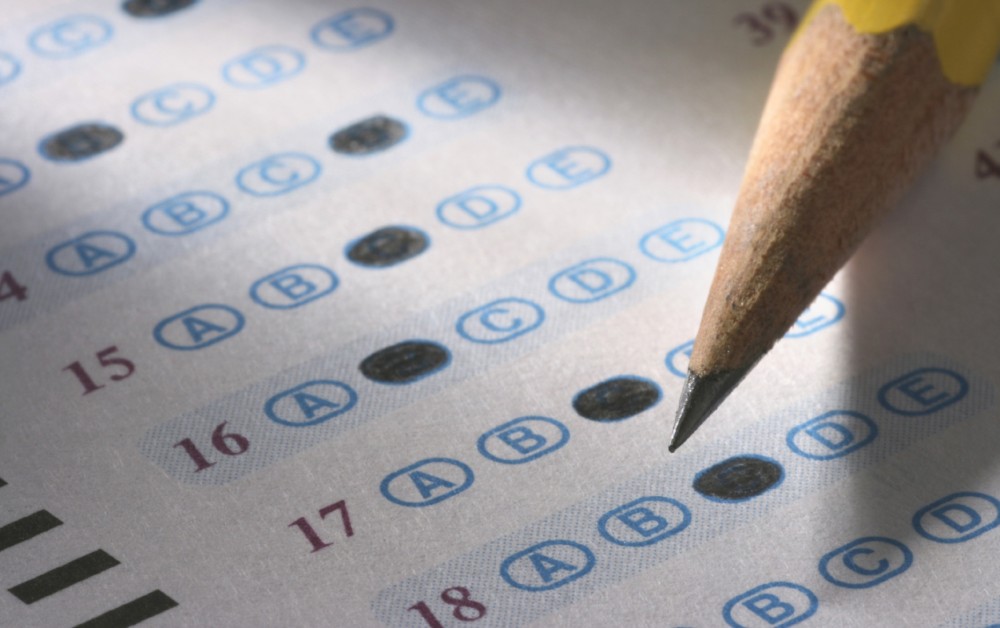 By DORY MacMILLAN – Features Editor
By DORY MacMILLAN – Features Editor
Is the government’s definition of “success” based too strongly on scores from standardized testing?
I have always been afraid of The Scantron. Yes, to me it has always been a living creature–not human, though, always too monstrous and precise for such sheer mortality. And, of course, The Scantron is never wrong, thus denying the basic foundation of humanity: error.

Image courtesy of www5.esc13.net
Perhaps it is because of this, because The Scantron is in no way human, but expects such a monotonous exactitude, that the art of answering correctly is formed: the art of bubbling in circles in a specific pattern.
Or lack thereof. That, of course, is what I have to remind myself. It is okay if it didn’t go from answer choice A to answer choice D. Or, it is okay if it did. Because I got a perfect ski-slope pattern or something resembling a Christmas tree or five D’s in a row didn’t mean I was wrong. Or did it?
I confess: I have testing anxiety. Yes, the increased heartbeat, trouble focusing and constant second-guessing do most certainly affect my ability to answer multiple-choice questions. However, I can safely say, my nervousness is not the only problem. The problem is also the method.
Here in lies my real question: how does a student’s ability to answer questions based on possible answers show that they truly understand a subject? Does it really mean that the content has been mastered because students can pick which answer is the least terrible?
Or that this skill, somewhat like gambling, means they should be praised for their genius and be given scholarships and recognition? Congratulations, you know which answer sucks the least.
These days, my thoughts are crowded by my lack of skill, my lack of ability to please The Scantron. I take AP chemistry test after test, speeding through the free-response section, only to reach the multiple-choice and second-guess every answer I thought that I knew.
Of course, it is not exclusive to chemistry. I took the SAT recently and realized that in my haste to finish, I was having trouble multiplying the number six by the number eight. Ironically, mental multiplication has always been one of my strong suits.
On that note, here’s another thing I don’t understand: why is there timed testing? Why would forcing a student to speed through a test, making certain that they are thinking only about finishing and less about thinking clearly through the answer, discern whether or not they are intelligent? In this case, it’s not only which answer sucks the least; it’s which answer sucks the least as you’re speed-reading and trying to remember the Pythagorean Theorem.
Naturally, there is more than one reason that The Scantron is a terrible, terrible thing: it attempts to destroy the quality of teaching. Teachers are force-feeding some empty version of knowledge into the brains of students—though this standardization has been thwarted by some of the amazing teachers I have had. My teachers force me to think, to go beyond “being able to identify the usage of hyperbole in The Crucible.”
These are the teachers that would be considered radical, that in the eyes of the government are not cooperating fully. If they cooperated fully, how would that help me learn? I know I wouldn’t be challenged. I know that the discussion of participial phrases would be much less enjoyable than the meaning of manhood and the discussion of exactly what type of manhood the great hunter himself, Ernest Hemingway,attempted to portray in A Farewell to Arms. I can only feel grateful that my teacher does not lay that question out in some sort of a fake assessment, that he forces me to think about it and decipher a meaning for myself.
The standards outline the proper knowledge for me to have, but for what end, exactly? I suppose it is so I will be most successful in passing my Advanced Placement exams or scoring high on the SAT. Maybe it is so I will go to a college that has deemed me fit for acceptance in large part-based on these scores and my grade point-average, and then I will become a “productive” member of society.
That is the success that I am being prepared for, but it is a contradiction of what it is to be American: to have an individualized, personal American dream, meaning that my success is not your success.
We, today’s generation of students, are all being prepped to follow, to conform into, one idea of success, that which creates a doctor or a lawyer or some other government-deemed necessary individual. But what about the artists? What about the writers? Or even, what about the mathematicians? Why does the girl who has never been able to score in the hundredth percentile on her multiple-choice math test learn to say that she hates math from an early age? Would she have hated it if she hadn’t seen all the harsh red exes on The Scantron?
It’s hard to say, this coming from a girl who does hate math. But I’ve also never considered myself good at it. It’s a bit late to wonder whether that would be different had I never felt the sting of the seventieth percentile as my teacher handed back the test on Monday that I sweated through that past Friday. Of course, I’m not blaming The Scantron. Maybe I should have studied more versus watching The Office. But chances are, I and many other students, would have done at least a little better if I could have explained why the answer or the equation was what it was versus trying to find some whimsically-chosen number that meant a lot on that specific test but would have no meaning ever again.
I know that they are watching. While The Scantron is merely the peephole for our government to ensure that their illogical standards are being followed, it is not at all inconspicuous. Of course, the ridiculous standardized testing is not the only eyes for our government, by any means.
There are also the men in black, or the women in nondescript pantsuits with the generic Hillary Clinton-coiffed hairstyle and probably a lot less going on upstairs. They come into the class and wave at the teacher, saying “please don’t be distracted.” But sometimes they will come around and ask students what the standard is that our lesson follows. Its fun to feign ignorance, but their worried looks that appear on otherwise emotionless faces when a student is unaware of the government’s mandate is troubling. “Calm down,” we want to say. “We do know what a Lewis base is! We just think you’re ridiculous!” It’s remarkable how loudly those words can be expressed without being ever being verbalized.
Still, this is not a call to anarchy. Perhaps that should have been a disclaimer. This is merely a statement from a student, one who battles The Scantron weekly, if not daily. Although I am not suggesting pitchforks, not hoping a mob will appear outside of the Department of Education in rage, this is a call to change. While some people might ace all standardized tests, bubble in for hours and get every answer right, I’m uncertain whether that’s a skill of which to be proud. It’s not an accurate test of knowledge, and it certainly isn’t helping students. The Scantron is generalizing the abilities of all students, something that treats us as statistics versus potentially productive members of society, all unique and all necessary. Ironically, isn’t that what we’re supposedly being trained to become?
